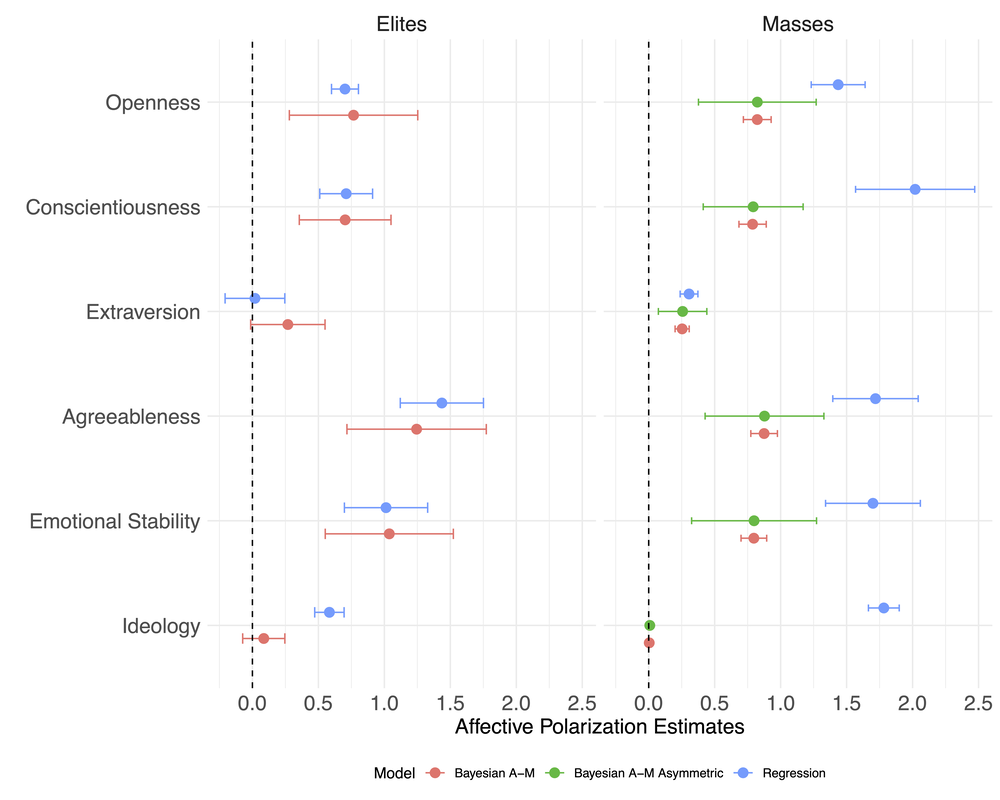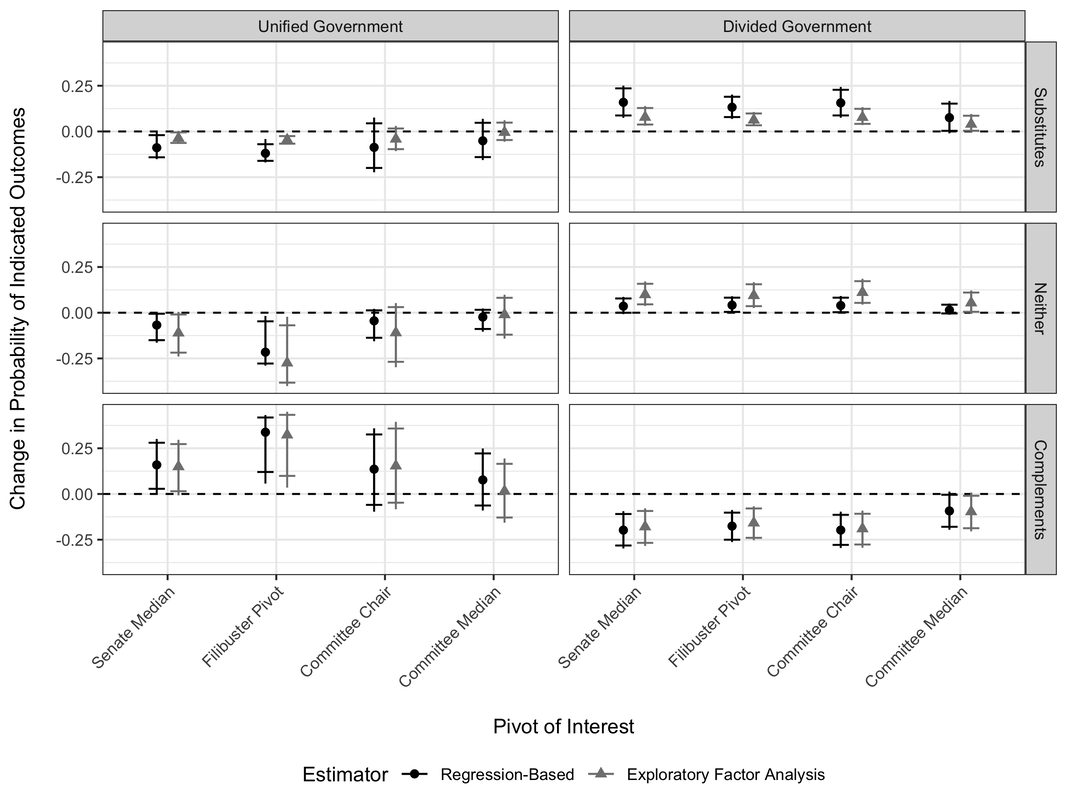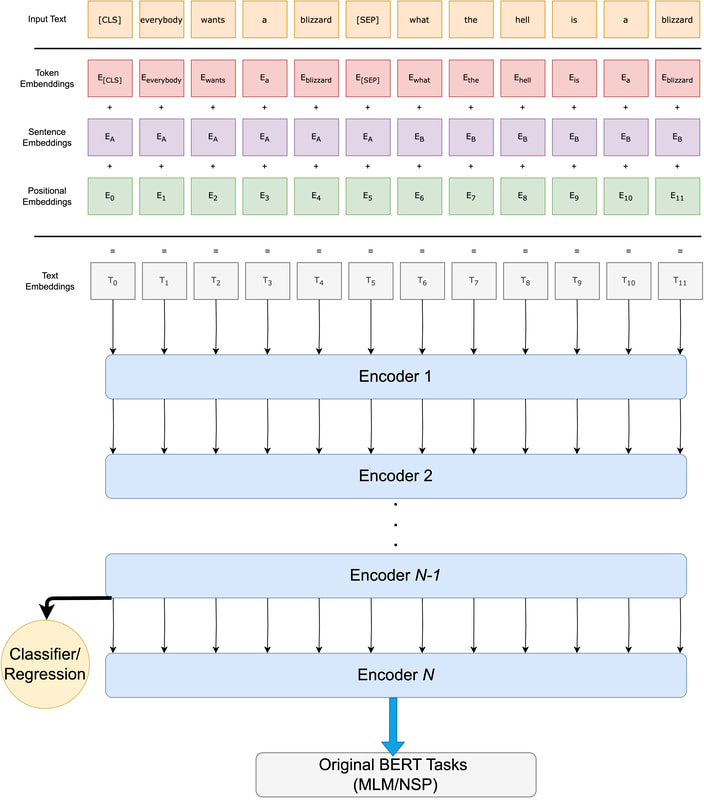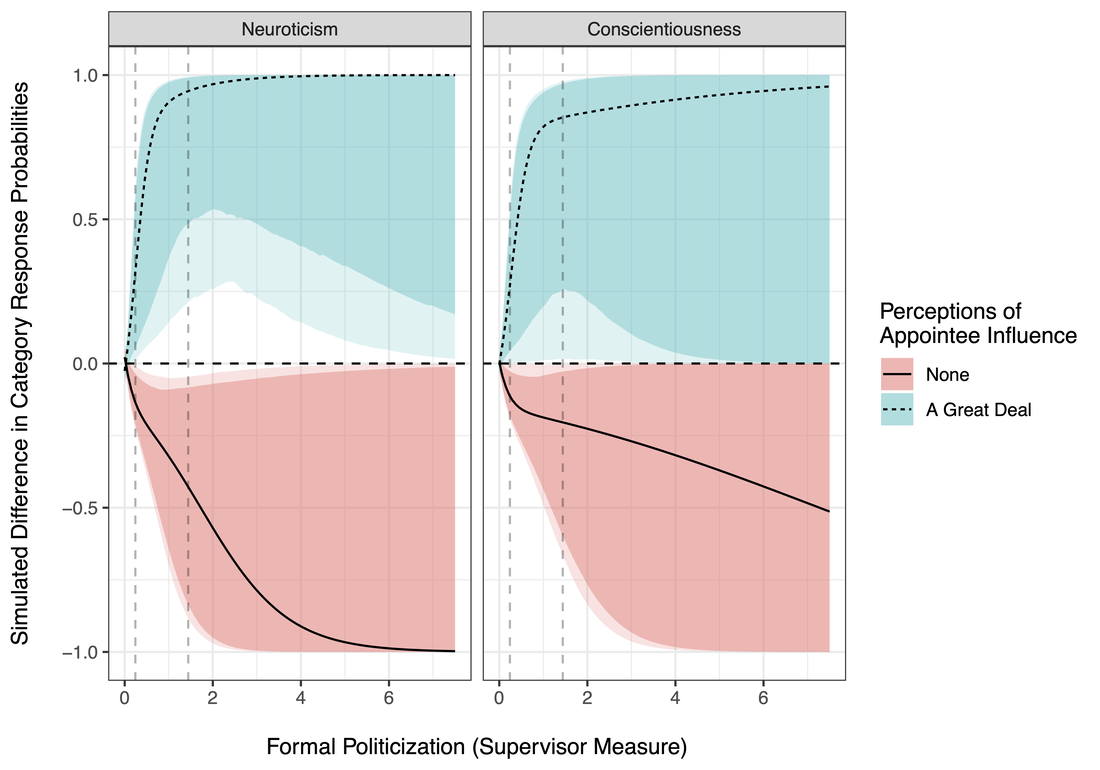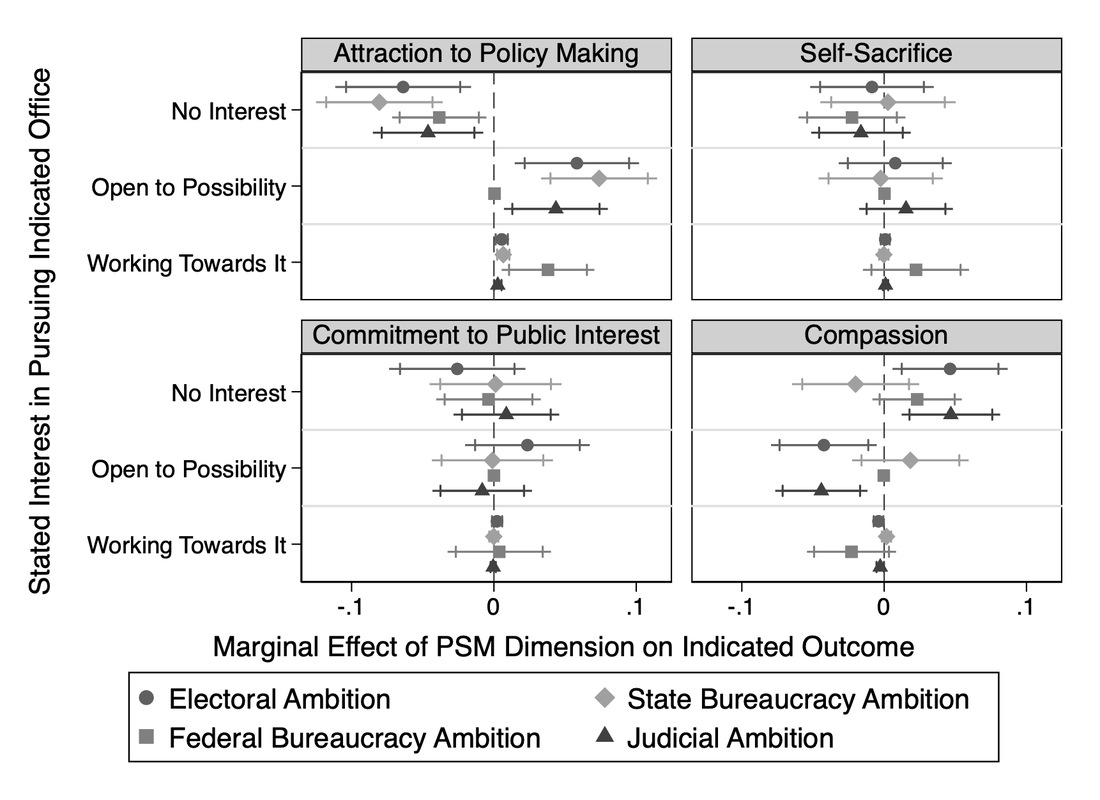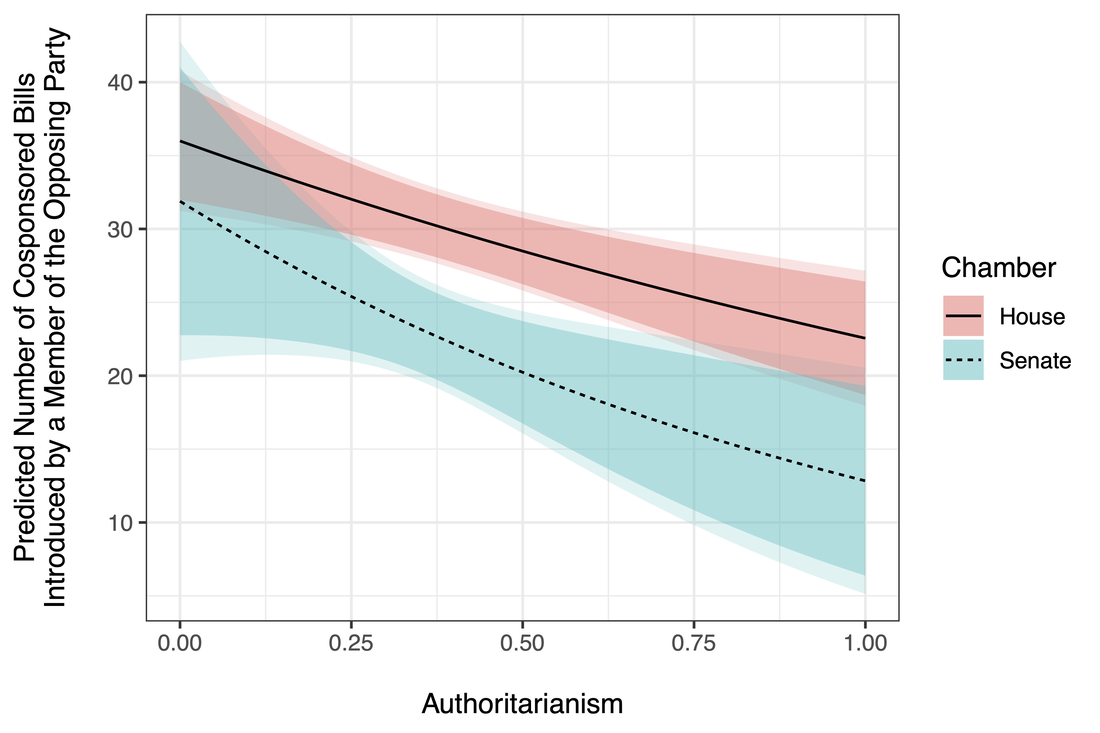Working Papers
|
"Affective Personality Polarization: Evidence from Political Elites and the Mass Public." (With Jonathan D. Klingler and Adam J. Ramey)
Affective polarization has been on the rise in recent decades, having dramatic consequences for everyday citizens’ willingness and ability to work together (Iyengar and Westwood, 2015; Iyengar et al., 2019; Boxell, Gentzkow and Shapiro, 2020). While this phenomenon has been studied largely in the mass public, it is undoubtedly raging in full force among political elites. Though most studies of affective polarization focus on in- vs. out-partisan thermometer ratings (Iyengar et al., 2019), other work has found similar results using behavioral games (Carlin and Love, 2013) and implicit association tests (Iyengar and Westwood, 2015). At the same time, recent work on personality traits in both psychology and political science has shown that the so-called Big Five model is a significant predictor of how voters make up their minds (Caprara et al., 2006) and what politicians do once in office (Ramey, Klingler and Hollibaugh, 2017). In this paper we bridge these literatures. Using data from an original survey of former U.S. Congressmembers and four election cycles’ work of Cooperative Election Survey data at the mass level, we demonstrate that there is a significant in- vs. out-party bias in personality assessments of elected officials among both elites and the mass public. Importantly, these findings are at least as large and sometimes significantly larger in magnitude to levels of bias in perception of elites’ ideology extremism. |
"Ambition With and Without Elections: Do Elections Change the Types of Individuals Who Want to Enter Public Service?" (With Hans J. G. Hassell and Matthew R. Miles)
Perhaps because studies of political ambition have focused almost entirely on electoral ambition, the presence of elections has been thought to play a major role in shaping who expresses interest in public service. In this paper, we examine whether the presence or absence of electoral institutions changes who expresses political ambition. Using surveys of law students, federal bureaucrats, and the general public, we find that the individual attributes and traits that predict ambition for elected office also predict ambition for bureaucratic and judicial service. We find that while electoral components of public service do attract (or deter) certain types of individuals, their effects on political ambition duplicate the effects of other components of public service. Rather than unique, electoral institutions are duplicative in their effects on the types of individuals who express political ambition, reinforcing rather than fundamentally changing who expresses ambition for public service.
Perhaps because studies of political ambition have focused almost entirely on electoral ambition, the presence of elections has been thought to play a major role in shaping who expresses interest in public service. In this paper, we examine whether the presence or absence of electoral institutions changes who expresses political ambition. Using surveys of law students, federal bureaucrats, and the general public, we find that the individual attributes and traits that predict ambition for elected office also predict ambition for bureaucratic and judicial service. We find that while electoral components of public service do attract (or deter) certain types of individuals, their effects on political ambition duplicate the effects of other components of public service. Rather than unique, electoral institutions are duplicative in their effects on the types of individuals who express political ambition, reinforcing rather than fundamentally changing who expresses ambition for public service.
|
"Executive Appointee Reliability under Separated Powers: Presidential Loyalty Among Leaders of U.S. Federal Agencies." (With George A. Krause; invited to revise and resubmit to the Journal of Political Institutions and Political Economy)
- Winner of the 2022 Midwest Political Science Association Best Paper in American Politics Award A theory of executive appointee reliability is set forth that analyzes two forms of presidential loyalty: (1) an appointee’s ideological proximity (ideological loyalty), and (2) their fealty to the president (non-ideological loyalty). Unconstrained presidents appoint individuals whose ideological proximity and fealty are complementary to one another for purposes of enhancing the reliability of executive appointees. As Senate constraints become more robust, presidents incur greater ex ante uncertainty regarding their executive appointment choices since they must rely less on such complementarity, as well as increasingly rely on substituting fealty for ideological proximity. Support for this theory is obtained from a statistical analysis of data on executive leadership appointments between the Reagan and Bush II presidencies. Lower executive appointee reliability transpiring during times of heightened interbranch policy conflict contributes to the inherent difficulties that presidents encounter in obtaining coordinated executive administration, despite their efforts at employing both politicization and centralization strategies. |
|
"More than Words: Extracting Latent Psychopolitical Traits and Preferences from Written Text." (With Jonathan D. Klingler and Adam J. Ramey; under revision)
We use recent advances in machine learning to illustrate how to extract latent psychological and political preferences and traits from linguistic cues present in written text. |
|
"Personality Traits and Perceptions of Agency Politicization."
This study explores the role of the Big Five personality traits (Openness, Conscientiousness, Extraversion, Agreeableness, and Neuroticism) in shaping federal employees' perceptions of politicization within their workplaces. While previous public administration research using these traits has primarily focused on performance and job satisfaction (with some notable exceptions), our large-scale survey of federal employees in the United States examines how these personality traits influence the extent to which formal politicization affects perceived politicization. We find that more Neurotic respondents perceive a greater degree of politicization as formal politicization increases, with more modest effects identified for more Conscientiousness. The paper concludes by discussing potential variations in outcomes due to these differences in perceptions and suggests interventions that public agencies can implement to mitigate any negative consequences associated with specific personality profiles. Further investigation of these issues is left to future research. |
|
"Seeking the Public Good: Public Service Motivation and Political Ambition" (With Hans J. G. Hassell and Matthew R. Miles)
Many previous studies have shown that public service motivation (PSM) is associated with public sector employment. However, with few exceptions, such studies have focused on unelected positions in public sector bureaucracies, despite many other avenues for public service. Using a nationally representative survey of United States respondents, a survey of federal bureaucrats, and a survey of law students, we show that, in addition to predicting ambition for high-level public sector positions, PSM also predicts ambition for elected office and judicial service. Moreover, the effects of the PSM dimensions are broadly comparable across different types of ambition (i.e., bureaucratic, electoral, and judicial), suggesting that the PSM dimensions—and especially Attraction to Policy Making (APM)—transcend institutions in explaining individuals’ interest in service in public sector offices of all types. |
|
"Talk Authoritarian to Me: Measuring Authoritarianism Using Speech" (With Jonathan D. Klingler, Adam J. Ramey, and Julie Wronski)
We develop a new methodological tool for assessing authoritarianism among political elites by measuring authoritarian dispositions through a set of language patterns. First, using a dataset of over 3,000 respondents who completed a 20 minute free-writing task and the child-rearing measure of authoritarianism, we apply machine learning algorithms to train text-based predictive models of authoritarianism. We then apply this authoritarian text classifier to members of Congress (MoCs) floor speeches from 1981 through 2015. These estimates in hand, we perform two validation exercises. First, we explore the relationship between authoritarianism and bipartisan cosponsorship in the U.S. Congress. Then, we examine how authoritarianism affects support for filibustering in the U.S. Senate. Overall, our text-based classifier allows us to measure and study authoritarianism among elites, a psychological predisposition which has previously gone invalidly measured or unobserved among this population. |
Works In Progress
"Advice and Consent in the American Civil War: Senate Voting on Military Nominations." (With J. Tyson Chatagnier)
"Cold as Ice: Dark Triad Personality Traits and Congressional Behavior." (With Jonathan D. Klingler and Adam J. Ramey)
"Consistency and Change in the Judicial Nominations Process." (With Lawrence S. Rothenberg)
"Does the Presence or Absence of Elections Remove Gender Differences in Ambition for Public Service?" (With Hans J. G. Hassell and Matthew R. Miles)
Staffing the Government: The Conundrum of Political Appointments. (With Lawrence S. Rothenberg)
"The Politics of Personnel: Examining the Relationship Between Bureaucratic Ideology and Bureaucratic Careers."
"Cold as Ice: Dark Triad Personality Traits and Congressional Behavior." (With Jonathan D. Klingler and Adam J. Ramey)
"Consistency and Change in the Judicial Nominations Process." (With Lawrence S. Rothenberg)
"Does the Presence or Absence of Elections Remove Gender Differences in Ambition for Public Service?" (With Hans J. G. Hassell and Matthew R. Miles)
Staffing the Government: The Conundrum of Political Appointments. (With Lawrence S. Rothenberg)
"The Politics of Personnel: Examining the Relationship Between Bureaucratic Ideology and Bureaucratic Careers."
